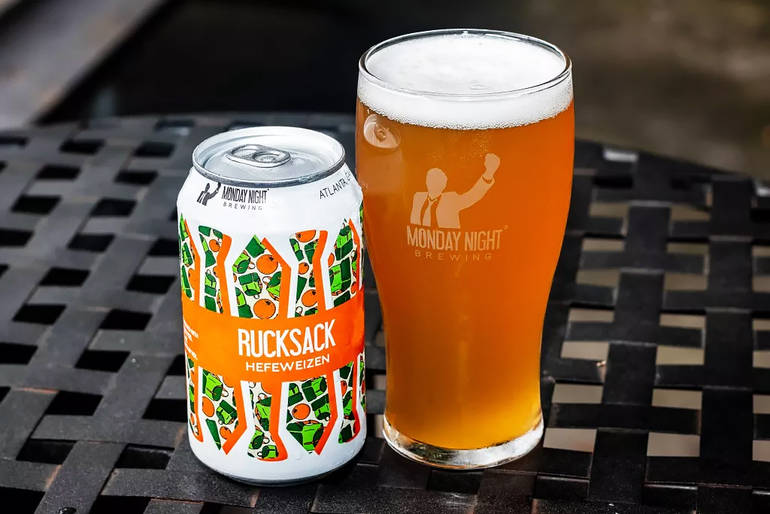Start 14-Day Trial Subscription
*No credit card required

Monday Night Brewing Debuts Rucksack, A New Summer Seasonal
Monday Night Brewing out of Atlanta, Georgia has announced its newest seasonal beer, a Hefeweizen called Rucksack.
The brewery's website describes the beer as having "low bitterness (usually around 20 IBUs), an unfiltered look and moderately high carbonation. Thanks to its fairly active yeasts, traditional Hefeweizens will have phenolic tastes/aromas of clove and banana. Coming in around 5-6% ABV, this beer is a light summer/fall easy sipper, and a beer that works great out on the lake, grilling out with friends, or just enjoying a relaxing day."
Rucksack was also brewed with 680 oranges per batch, providing a sultry citrus kick to keep you coming back for more.
The full release from Monday Night is below.
THE GERMANS DON’T MESS AROUND WITH THEIR BEER.
In fact, they put strict laws in place about making beer back in the 1500s. The Reinheitsgebot, (or German Beer Purity Law, because we can’t pronounce that either) states the only allowable ingredients in beer could be water, hops and barley. Yeast hadn’t been discovered yet, so it gets a pass. Aside: if you want to know more about how Germans fermented their beer, read this. It involves a magic stick.
Even though the Reinhe…err…German Beer Purity Law was repealed in 1987, Germans still take pride in these traditional styles. But heck, you can find American IPAs in Munich these days.
But styles like Kölsch, Bock, Pilsners and Marzens have been around for centuries for a good reason. They’re clean, they’re crisp and they are drinkable.
Another one of these styles is Hefeweizen.
Coming out of Bavaria in Southern Germany, it’s part of a family of beers called “Weissbiers” (or White Beers) that were quite popular back in the day. One problem. Weissbiers were brewed with a lot of wheat – which was a violation of the German Beer Purity Law. However, there were some people in high places (Dukes and such) that were fans of these beers. They used their political clout to create loopholes to keep their favorite brew flowing.
Weissbiers and other wheat beers came to America with German immigrants. However, the style went out of favor in the first few decades of the 20th century, and Prohibition effectively killed it off.
However, during the Cold War era, American soldiers stationed in Germany once again got exposed to Weissbiers, and interest in the style started to return. Anchor is credited with brewing the first American wheat beer since Prohibition in 1984, and breweries like Celis and Allagash started brewing Belgian-style Weissbiers domestically in the early 90s. Today, wheat beers can be found in taprooms all over the country. But what makes the Hefeweizen unique?
This style of wheat beer is noted for its low bitterness (usually around 20 IBUs), unfiltered look and moderately high carbonation. Thanks to its fairly active yeasts, traditional Hefeweizens will have phenolic tastes/aromas of clove and banana. Coming in around 5-6% ABV, it’s a light summer/fall easy sipper, and a beer that works great out on the lake, grilling out with friends, or just enjoying a relaxing day.
That’s why Monday Night Brewing developed Rucksack. This classic Hefeweizen was brewed with the peels from 680 oranges per batch.
“WE LIKE TO APPROACH HYPER-CLASSIC STYLES LIKE THESE, MAKE IT GRADE A TO STYLE, BUT PUT OUR UNIQUE TWIST TO IT,” SAID MONDAY NIGHT BREWING HEAD BREWER PETER KILEY. “WE WANTED TO SWITCH UP THE AROMA A LITTLE BIT, SO THAT’S WHY WE ADDED ORANGE PEEL.”
While Hefeweizens may seem simple at first, it’s styles like these that can trip a brewer up.
“There’s a lot of science and thought that goes into a style like this. We had to get the right fermentation temperature to make Rucksack as balanced as we wanted it. Just a single degree in either direction would really affect the properties of this beer.”
When you crack open a Rucksack, the first hit you get on the nose is, naturally, oranges. But you also get a little of that banana and clove spiciness that’s endemic to the style. Take a sip, and the citrus notes counter the spice just enough. Then, the dry finish almost begs you to take another swig.
“The aromatic properties of Rucksack help fit the background of a traditional Hefeweizen, but we wanted to put our own spin on it,” said Kiley. “We made this one for the southeast beer drinker. It’s crisp and clean.”
Rucksack is available on tap and in cans wherever you can find Monday Night Brewing.
If you want to learn more about the history of Hefeweizens and wheat beers, check these links out:
A Brief History of Hefeweizen – Beerboozebites.com
Wheat Beers – Wikipedia



